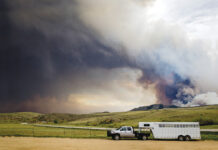
Weight loss is the most common health issue seen in horses during the winter. Knowing when and how much extra to feed can be tricky. Research has shown that an average adult horse requires extra calories when temperatures dip below 18 F. For every degree under 18 F, a horse will require a roughly 1 percent increase in energy.
While nutrient requirements don’t change in cold temperatures (other than calories), you may consider offering loose salt for your horse, as many horses are understandably reluctant to lick a frozen salt block in the winter.
To keep tabs on your horse’s weight, start by taking a measurement with a weight tape prior to the start of winter and again halfway through the season. You can also evaluate your horse’s body condition score on a monthly basis. Evaluate body condition in the winter by physically touching your horse; a thick winter coat can hide weight loss. Finding out your horse is losing weight halfway through the winter is easier to rectify rather than at the end of the season. Consult your veterinarian if you are having particular trouble keeping weight on your horse in the winter.
Back to Horse Health in Winter >>
This article originally appeared in the November 2014 issue of Horse Illustrated. Click here to subscribe!





